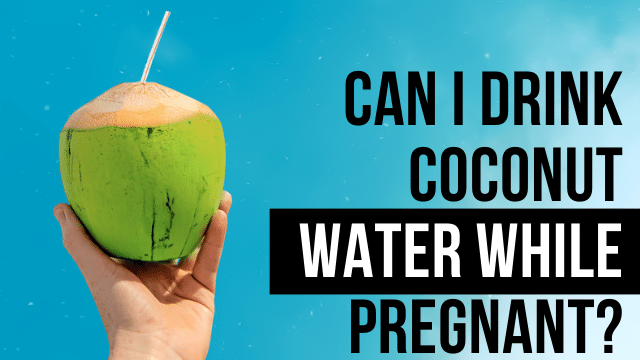Certainly, you can enjoy coconut water while pregnant. It serves as a hydrating and electrolyte-rich beverage with potential benefits for expectant mothers. These benefits include replenishing lost fluids, alleviating acid reflux, and providing some nutrients essential for fetal development. It’s important to note that while coconut water is a healthy option, it should not replace water or other necessary fluids. Additionally, individuals with conditions such as high blood pressure or morning sickness should exercise caution, and consulting with your doctor about any concerns regarding coconut water consumption during pregnancy is advisable.
Is Coconut Water Safe During Pregnancy?
Expectant mothers often question the safety of various foods and beverages during pregnancy, and coconut water is no exception. Obstetricians and Gynecologists generally advise avoiding items with potential bacterial growth, such as soft cheeses and sushi. Concerns arise regarding the safety of coconut water, and understanding its pasteurization status is crucial. Most commercially available coconut waters, like VitaCoco and Zico, are pasteurized, ensuring they are safe for pregnant women.
While certain cold-pressed coconut waters, such as Harmless Harvest, remain unpasteurized, they undergo a filtration process to maintain sterility and eliminate bacteria.
The primary determinant of coconut water safety during pregnancy is proper storage. Adhering to guidelines, whether it involves refrigeration or specific consumption dates, takes precedence over the brand or type of coconut water.
Benefits of Coconut Water for Pregnant Women
Although coconut water may not be a miraculous health elixir, its nutrient content can be particularly advantageous for pregnant women. Here are eight reasons why expectant mothers may consider incorporating coconut water into their diet:
- Hydration Source: Coconut water serves as a hydrating beverage, providing essential electrolytes. Comprising 95% water, it offers a more enjoyable alternative for some individuals compared to regular water. Importantly, coconut water lacks added sugars, flavors, and dyes, making it a superior choice over sugary drinks or juices. Despite its benefits, water remains the recommended primary source of hydration during pregnancy.
- Electrolyte Content: Pregnant women often experience electrolyte loss due to conditions like morning sickness. Coconut water naturally contains vital electrolytes such as potassium, sodium, and magnesium, helping replenish these essential elements. It can be especially beneficial after vomiting, aiding in stabilization and restoring energy. However, for severe conditions like hyperemesis gravidarum, medical consultation is advised.
- Acid Reflux Relief: Coconut water may provide relief for pregnancy-related heartburn and acid reflux. As progesterone levels increase during pregnancy, stomach valve relaxation occurs, leading to discomfort and acid reflux. While scientific evidence supporting coconut water’s efficacy in soothing acid reflux is limited, anecdotal accounts from pregnant women suggest its potential benefits.
- Fetal Development Support: Coconut water contributes to fetal development by supplementing essential nutrients, including calcium, potassium, and magnesium. The nutrient composition varies by brand, emphasizing the importance of maintaining regular prenatal vitamin intake. While coconut water can support factors like healthy birth weight and bone development, it should not substitute prenatal vitamins.
- Blood Pressure Regulation: High blood pressure is common during pregnancy, and the elevated potassium levels in coconut water may assist in promoting healthy blood flow and reducing high blood pressure. While additional studies are warranted, preliminary research indicates a potential reduction in systolic blood pressure with regular coconut water consumption.
- UTI Prevention: Pregnant women, prone to urinary tract infections (UTIs), may benefit from natural diuretics like coconut water. Increased frequency of urination reduces the risk of UTIs, providing a preventive measure for those susceptible to such infections.
- Post-Workout Hydration: Coconut water, with its hydrating properties and electrolyte content, serves as an excellent post-workout drink. It presents a healthier alternative to sugary sports drinks and aids in rehydration after pregnancy-friendly workouts, ranging from gentle yoga to more intense training.
- Mocktail Ingredient: Embracing a pregnancy lifestyle often means forgoing traditional nightlife activities. While bar visits may be off-limits, pregnant women can still enjoy refreshing mocktails. Coconut water, being non-alcoholic, naturally flavored, and low in sugar and carbs, offers a suitable option for crafting delightful mocktails.
In conclusion, incorporating coconut water into a pregnant woman’s diet can provide hydration, essential nutrients, and potential relief from certain pregnancy-related discomforts. However, it is essential to prioritize water as the primary source of hydration and maintain a balanced diet. Pregnant women should consult with their healthcare providers to address individual concerns and ensure that coconut water consumption aligns with their specific health needs during pregnancy.
When should I start drinking coconut water during pregnancy?
For expectant mothers engaging in gentle activities such as yoga, meditation, or light exercises, incorporating coconut water into their routine is a recommended practice. Opting for coconut water as a beverage during these activities can provide hydration and essential nutrients.
Furthermore, introducing coconut water into the diet during the initial three months of pregnancy holds potential benefits. This period coincides with the early stages of pregnancy, and consuming coconut water during this time may assist mothers in managing morning sickness and alleviating fatigue. The hydrating properties and natural electrolytes found in coconut water can contribute to a sense of refreshment and may offer relief during the early phases of pregnancy.
What is the best water to drink while pregnant?
What Water is Ideal for Pregnancy? The optimal choice for water consumption during pregnancy is filtered tap water or purified bottled water stored in BPA-free containers. Tap water is subject to rigorous regulation by the Environmental Protection Agency (EPA). However, to further enhance safety levels for both the mother and baby, utilizing additional filters for tap water is advisable. This precaution ensures an extra layer of purification and quality assurance. Opting for BPA-free bottled water, known for its purification processes, is also a suitable and convenient alternative for expectant mothers.
Is coconut water good for babies?
Indeed, coconut water can offer various advantages for babies. It contains monolaurin, a compound known to support the immune system, aiding in the fight against illnesses, protecting infants from colds and flu, and contributing to the battle against infections. In comparison to regular spring water, coconut water is rich in nutrients, making it a particularly beneficial choice for babies, especially during periods of illness. Its nutrient content and potential immune-boosting properties make coconut water a valuable addition to a baby’s diet.
Is coconut water good for pregnant women?
Absolutely! Consuming coconut water is a wise and healthy choice throughout your pregnancy. Disregard any misconceptions surrounding the consumption of coconut water during pregnancy; it is simply a nutrient-rich, hydrating beverage that provides enjoyment and rejuvenation, devoid of any magical properties. Embracing coconut water as part of your diet can contribute positively to your overall well-being during pregnancy.
Is canned coconut milk safe during pregnancy?
Certainly! Consuming canned coconut milk is considered safe during pregnancy, provided it is not used as a complete substitute for water. Additionally, it can be safely incorporated into your cooking routines. It’s worth noting that coconut milk has a higher fat content compared to other milk alternatives, and this is an aspect to be mindful of during pregnancy.


